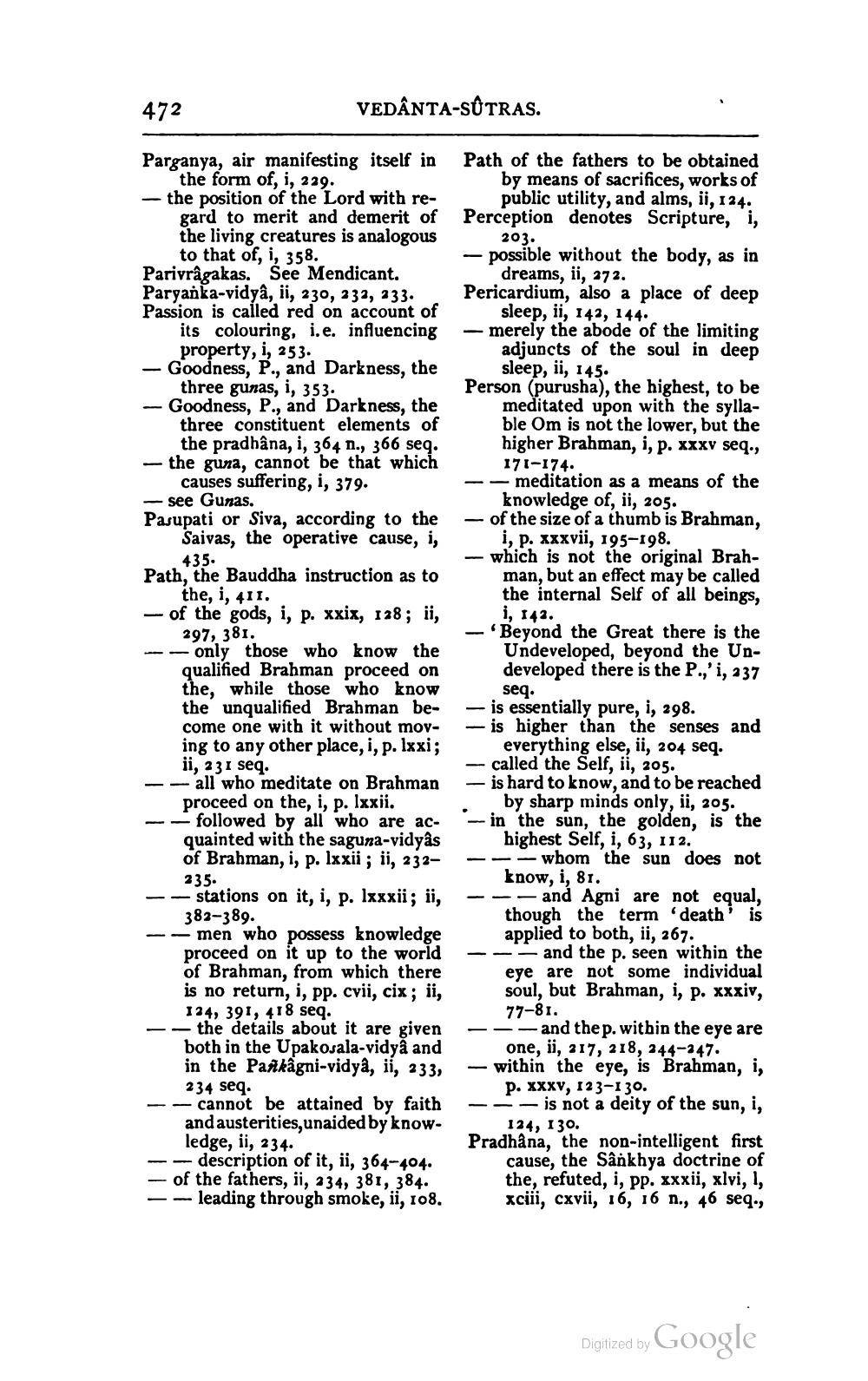________________
472
Parganya, air manifesting itself in the form of, i, 229.
VEDANTA-SUTRAS.
-the position of the Lord with regard to merit and demerit of the living creatures is analogous to that of, i, 358. Parivrâgakas. See Mendicant. Paryanka-vidyâ, ii, 230, 232, 233. Passion is called red on account of its colouring, i.e. influencing property, i, 253. Goodness, P., and Darkness, the three gunas, i, 353.
- Goodness, P., and Darkness, the three constituent elements of the pradhâna, i, 364 m., 366 seq. - the guna, cannot be that which causes suffering, i, 379. -see Gunas.
1
Pasupati or Siva, according to the Saivas, the operative cause, i, 435.
Path, the Bauddha instruction as to the, i, 411.
- of the gods, i, p. xxix, 128; ii, 297, 381.
-only those who know the qualified Brahman proceed on the, while those who know the unqualified Brahman become one with it without moving to any other place, i, p. lxxi; ii, 231 seq.
all who meditate on Brahman proceed on the, i, p. lxxii.
followed by all who are acquainted with the saguna-vidyâs of Brahman, i, p. lxxii; ii, 232
235.
-stations on it, i, p. lxxxii; ii, 382-389.
--men who possess knowledge proceed on it up to the world of Brahman, from which there is no return, i, pp. cvii, cix; ii, 124, 391, 418 seq.
-- the details about it are given both in the Upakosala-vidyâ and in the PaЯkâgni-vidyâ, ii, 233, 234 seq.
cannot be attained by faith and austerities,unaided by knowledge, ii, 234.
description of it, ii, 364-404. of the fathers, ii, 234, 381, 384. leading through smoke, ii, 108.
——
Path of the fathers to be obtained by means of sacrifices, works of public utility, and alms, ii, 124. Perception denotes Scripture, i,
203.
- possible without the body, as in dreams, ii, 272.
Pericardium, also a place of deep sleep, ii, 142, 144.
-
- merely the abode of the limiting adjuncts of the soul in deep sleep, ii, 145.
Person (purusha), the highest, to be meditated upon with the syllable Om is not the lower, but the higher Brahman, i, p. xxxv seq., 171-174.
meditation as a means of the knowledge of, ii, 205.
- of the size of a thumb is Brahman, i, p. xxxvii, 195-198. which is not the original Brahman, but an effect may be called the internal Self of all beings, i, 142.
- 'Beyond the Great there is the Undeveloped, beyond the Undeveloped there is the P.,' i, 237 seq.
- is essentially pure, i, 298. - is higher than the senses and everything else, ii, 204 seq. - called the Self, ii, 205.
- is hard to know, and to be reached by sharp minds only, ii, 205. in the sun, the golden, is the highest Self, i, 63, 112. ---whom the sun does not know, i, 81.
and Agni are not equal, though the term 'death is applied to both, ii, 267. --and the p. seen within the eye are not some individual soul, but Brahman, i, p. xxxiv, 77-81.
and the p. within the eye are one, ii, 217, 218, 244-247. - within the eye, is Brahman, i,
-
p. XXXV, 123-130.
is not a deity of the sun, i, 124, 130. Pradhâna, the non-intelligent first cause, the Sânkhya doctrine of the, refuted, i, pp. xxxii, xlvi, 1, xciii, cxvii, 16, 16 n., 46 seq.,
Digitized by Google




